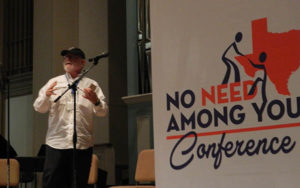SAN ANTONIO—Immigrants, asylum-seekers and homeless people who suffer from disabling mental illness or addiction all deserve to be treated with dignity, speakers told the No Need Among You Conference.
Sister Norma Pimentel, executive director of Catholic Charities of the Rio Grande Valley the past 12 years, described the challenge of responding to immigrant families and asylum-seekers who are fleeing violence in their homelands.
“When you see these families face-to-face with all they suffer, you understand deep down there is something we must do,” Pimentel told the conference, sponsored by the Texas Christian Community Development Network.
About five years ago, when an unprecedented surge of unaccompanied minors reached the border, her organization created the Humanitarian Respite Center in McAllen at Sacred Heart Church.
Christians from many denominations have supported the ministry there, including Vanessa Quintanilla-Lerma with Texas Baptists’ River Ministry. Buckner International provided thousands of shoes to children at the center as part of its Shoes for Orphan Souls program.
“We are all there, working together as one community—one church,” Pimentel said. “We are restoring human dignity.”
‘Welcome the stranger’
In the past five years, she has seen the number of people served at the respite center rise and fall as United States policies toward immigrants and asylum-seekers have changed.

The current “remain in Mexico” policies—the Migrant Protection Protocols—that went into effect recently require anyone seeking asylum to wait in Mexico until their scheduled court dates in the United States. Although churches in northern Mexico are seeking to respond to the needs, “there is a lot of human suffering happening today,” Pimentel insisted.
“They say, ‘If I stay at home, my child’s life is in danger.’ So, they risk everything, hoping for the best,” she said. “They come to our border, hoping they will be welcome. They live at the periphery. …
Sign up for our weekly edition and get all our headlines in your inbox on Thursdays
“The world is weeping. It is our responsibility to reach out and be present among them. We must be bold, do what is right, and welcome the stranger. … God calls us to protect human life.”
Community is the answer
Protecting human life and treating people on the periphery with dignity also includes the homeless population, according to Alan Graham, founder and chief executive officer of Mobile Loaves & Fishes in Austin.

Since 1998, Mobile Loaves & Fishes has served more than 5.5 million meals to men and women living on the streets, and it has inspired other groups to start similar food truck programs across the country.
In recent years, his organization launched Community First! Village, a 51-acre master planned development that offers affordable permanent housing—RVs and micro-homes—to men and women who have experienced chronic homelessness.
“Housing will never solve homelessness, but community will,” Graham said.
Unlike the “hermetically sealed single-family sarcophaguses” of the suburbs where neighbors don’t know each other, residents at the village “don’t hide anything,” he said. Residents know who has mental health issues and who has a substance abuse addiction.
“We believe the greatest single cause of homelessness is the profound, catastrophic loss of family,” Graham said. At the village, residents find an extended family.
‘Innate desire to be purposeful’
The chronically homeless learn to live in a supportive community where they have opportunities to rediscover their God-given talents and earn a dignified income through a variety of entrepreneurial micro-enterprises, he explained.
“People have an innate desire to be purposeful,” Graham said.
Residents are required to pay rent every month, to obey civil law and to observe community rules, such as keeping the village clean and tidy.
Before finally escaping zoning restrictions by locating just beyond the northeast Austin city limits, the village faced stiff opposition from residents who insisted “not in my backyard,” Graham noted.
In particular, they voiced fear that crime would increase and property values would plummet if the formerly homeless moved into their areas.
“In fact, the most preyed-upon people in society are the homeless,” Graham said. “Not one single crime has been committed in the neighboring community by a resident of the village, but seven crimes have been committed in our community by people who live in the community next door.”
Property values in the area closest to the village have increased 40 percent, he added.














We seek to connect God’s story and God’s people around the world. To learn more about God’s story, click here.
Send comments and feedback to Eric Black, our editor. For comments to be published, please specify “letter to the editor.” Maximum length for publication is 300 words.